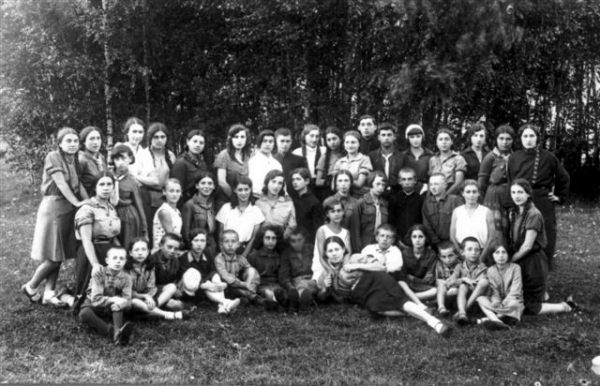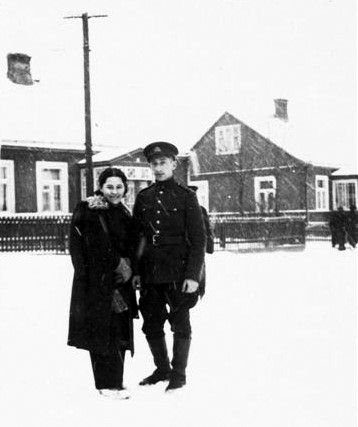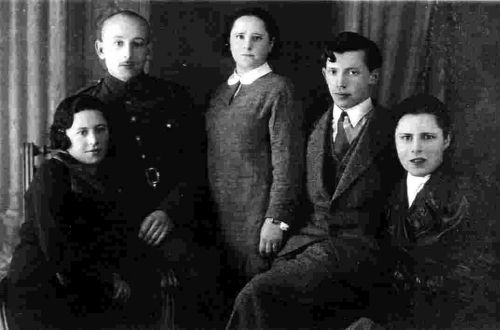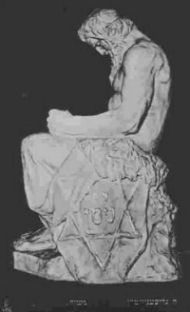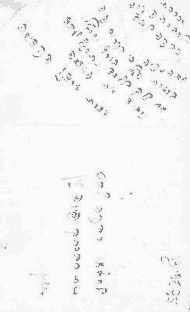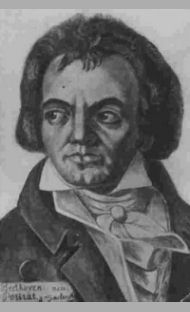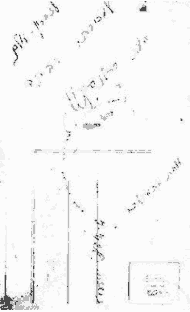[Pages 198-203]
Moral Values from Home
By Rivka Levitt
Translated by Judy Grossman
Sarah Weiss (Slep): When I visited Rivka in the hospital she asked me to write down her story. Worn out from her illness, she began to speak in a whisper. However, when she went on to talk about Dusiat, it was almost miraculous to see her sudden changeover from terrible weakness to a condition of strength and power, an energetic voice and loud laughter – again that healthy and strong Rivka, as we will certainly all remember her…
It seemed as though she was there… again reliving all the experiences. From time to time she emphasized: “I am not telling about myself. This is the story of the shtetl. This is the story of all the Dusiaters.” [1]
|
|
| |
| Hashomer Hatzair Members in Dusiat with their Counselor Rivka Levitt (bottom)
From right to left, standing: Libka Kasimov, Mirka Baron, Rachel Slovo, Bailke Pores, Lida Tzelekovitz (stepdaughter of the ritual slaughterer), Motele Slep (son of Yudel and Gitel Slep), David Zak, Rivka Shub, Itale Charit, Rachel Shub, Yitzchak Shteinman (Zarasai), Zeldka Charit, Sarka Melamed, Bailke Krut, Sheine Yossman, Chava Shub, Iska Zeif, Nechamka Yudelowitz
Middle row: Sheinke Chaitowitz, Bailka Fein, Lolke Slovo, Beinish Yudelowitz, Sonia Slovo, Chanka Glezer, Estherka Yossman?, Elka Melamed, Rivka Aires, Chanka Pores, Tzilka Shub, Hene-Bailke Blacher, Rivka Pores
Bottom: (-), brothers Avraham and Dov Schwartz, Etka Yossman?, David Bun, Hene-Libale Shub (embracing Rivka Levitt), (-) Estherka Glezer, Itzke-Yitzchak Feldman, Roche-Mashka (the redhead), Zamke Fein, Itale Slovo and her brother Velvale |
… My beloved shtetl, Dusiat. Nature has generously endowed Lithuania with enchanting beauty and Dusiat in particular. It is a country of forests, lakes and rivers… and my shtetl lies in a landscape of greenery and water… and in the winter it is all covered in white like a beautiful bride…
|
|
| |
| Rivka with her brother Shaul |
The members of my generation can't hold anything against Lithuania of that time. Lithuania gained its independence in 1918, after many long years of repression. When it gained its independence it treated the Jews well. The fact is that when it became independent the Hebrew schools began to flourish, and this was also with governmental assistance. And not just the schools, but also the teachers' seminars for Hebrew teachers were funded by the government. There were the elementary schools of the Tarbut network, and high schools – all of them exclusively in the Hebrew language.
The Lithuanian government indirectly helped Zionism, and made the existence of the youth movements possible… At that time they had respect for the members of the youth movements. The Gentiles of our age who attended the Lithuanian schools treated me and others like me with respect when they learned that we were members of Hashomer Hatzair…
We had studied Hebrew even before then. People studied with the heads of the shtetl community, all of whom were scholars and well versed in the Torah. The goal was to teach and prepare a boy for his Bar Mitzvah. To teach Judaism was a kind of mission. What mother in Dusiat didn't want her child to study? Every mother aspired that her son would be a rabbi…
And when they suddenly received a permit to open a school in the shtetl, it was decided that it would be located in the old synagogue. Everyone contributed to setting it up: teachers, parents and siblings. They installed benches, desks and dividers, and opened five or six classes there. And there were already Hebrew teachers, all of them natives of Dusiat. It was as though the hand of the Lord had directed that teachers should be prepared. There were teachers who were discovered, and there were those who revealed themselves… and good teachers, all of them Hebrew speakers, who also taught arithmetic, and were honest…
|
|
| |
Rivka with her brother Shaul (left), Zvi Levitt
son of Getzl and Michl(second from right) |
Batya Aviel (Levitt): Getzl Levitt was the brother of Yosef and Sonia. He was married to our aunt Michl, our father's [Reb Moshe Levitt] sister…
Uncle Getzel Levitt left Dusiat and moved to a big city so that his children could go to university. His son Zvi graduated from university in Kovno.
… And Zvi Levitt, I can't forget how he read the poem “El Hatzipor” [“To the Bird” by Chaim Nachman Bialik]. He lived the poem, and would actually weep tears. He was full of emotion and of Torah, and was in love with the Hebrew language, and via it he passed on to us his love for Eretz Yisrael.
When I came to Dusiat as a tourist from Eretz Yisrael, the teacher Yudel Slep took my hand, and in a voice quivering with tears he said to me:
“I must tell you, that when your father [Reb Moshe Levitt] was taken to the hospital, everyone came to say goodbye to him. I was the last person to speak to him, and he said to me (Rivka began crying but didn't stop telling her story): 'So, I won't return… and there are still children at home. You are the teacher. You'll help…' ”
There really was great respect for the teacher …
|
|
| |
| Letter from the Instructor of Community Affairs to the Dusiat Community Council [2] |
| A. Helfer
Instructor of Community Affairs
Ministry of Jewish Affairs in Lithuania
Kaunas
To the Dusiat Community Council!
I was very favorably impressed by my visit to your Community Council. I saw the honeymoon of organized public activity and how sweet and good it is. The various “complainers” also added charm, because even an evil angel against his wishes said “Amen” to all your actions. The cultural school and its good teachers are constantly before my eyes. And, in accordance with Jewish Law, I informed the School and Culture Administration in Lithuania of the gift that the teachers and activists gave me…
I hereby remind you what was decided in my presence:
a) To rent an apartment for an office
b) To make a sign for the Community Council in Lithuanian and Hebrew
To accustom the people to pay for matters of Jewish concern and benefit, i.e. to impose the positive tax… |
…And there was a library in the shtetl.
In the mornings we skated on the ice and frolicked, and in the evenings we met in the library that had been set up in Meir Levitt's house (son of Berl Levitt and Rachel). We came there once a week to take out books, and we used to exchange opinions about the books that we considered good and recommended. That period of gathering in groups fashioned my personality more than high school…
The acts of charity were an important part of the activities of shtetl residents. Every woman in Dusiat knew who lacked something. The Jewish public in the shtetl took care of the lonely and the unfortunate. Orphans ate “yamim“ [meals at a certain home on a specific day], and this was something completely natural. There were charity boxes in every home: Meir Baal Hanes, The Orphanage, Linat Hatzedek [Charitable Housing], Matan B'seter [Anonymous Donation], and of course, The Jewish National Fund box.
The children were required to collect donations, and if a major sum was required, they recruited respected people for it, that is, the teachers.
Bikur Holim [visiting the sick] was not just a charity box. When someone became ill, people volunteered to take turns sitting at his/her bedside, in order to make things easier for the family. No one was left to die on his/her own.
Continuation of A. Helfer's letter …[2]
| …
If there are any refugees among you who have returned from Russia, and they lack clothes, shoes or money for business or building – you can obtain them now from the Department for Refugee Affairs. Make a list of all those who are in need, e.g. of clothes, or all those who are in need of food (not for scrounging but to work and earn a wage). Make a list of how much is needed and how much can be lent. The Refugee office is now helping with loans to refugees, i.e. with payments by installments by the Folk Bank. If such an institution does not exist, it should be founded. This office is to be found beside the Country Council.
Respectfully and politely
A. Helfer |
On the eve of Tisha b'Av[3], everyone went to the synagogue to read and hear “Eikha“ - “How doth the city sit solitary…”[4] (Rivka said this with a melody). I absorbed the lamentation with all my senses.
And the 11th day of Adar[5] - at Raska's home. The Shub girls, Batya and Chava came there, and we spent a really emotional evening. I am still moved when I recall it and the warm home… We sang songs about Trumpeldor all evening long [“Kol Hayom Bemaharashti…” – Rivka sang in a quivering whisper - and I am ready to experience it again. The Shub sisters' grandfather [Reb Shaul-Dovid] was very religious. The observance in their home inserted a festive atmosphere, an atmosphere of holiness, and I used to be envious.
I always appreciated the family gatherings on holidays and the family meals…
If I am able to leave the hospital, I will hold the Passover Seder in my home …
Postcards from Rivka's Album
|
|
|
|
|
| Redeemer
To Rivka my friend, from your friend Pua Wein, Utian [Utena] 15.6.1925 “As a memento to my dear friend Rivka Levitt, Let us hope that soon we'll be in Eretz Yisrael. There we'll learn, get used to working, cultivate the land of our holy homeland. |
Beethoven
“One of my pictures, as an eternal memento to my acquaintance Rivka from A. Smolensk.” |
Footnotes
- Additional passages from Rivka's memoirs are incorporated in other chapters of the book. Return
- From the YIVO Archives, document 8451. Return
- Fast to commemorate the destruction of both temples in Jerusalem. Return
- Book of Lamentations. Return
- The day of the attack on Tel Hai, when Yosef Trumpeldor was killed. Return
This material is made available by JewishGen, Inc.
and the Yizkor Book Project for the purpose of
fulfilling our
mission of disseminating information about the Holocaust and
destroyed Jewish communities.
This material may not be copied,
sold or bartered without JewishGen, Inc.'s permission. Rights may be
reserved by the copyright holder.
JewishGen, Inc. makes no representations regarding the accuracy of
the translation. The reader may wish to refer to the original material
for verification.
JewishGen is not responsible for inaccuracies or omissions in the original work and cannot rewrite or edit the text to correct inaccuracies and/or omissions.
Our mission is to produce a translation of the original work and we cannot verify the accuracy of statements or alter facts cited.
 Dusetos, Lithuania
Dusetos, Lithuania
 Yizkor Book Project
Yizkor Book Project
 JewishGen Home Page
JewishGen Home Page
Yizkor Book Director, Lance Ackerfeld
This web page created by Lance Ackerfeld
Copyright © 1999-2026 by JewishGen, Inc.
Updated 27 Sep 2009 by LA
